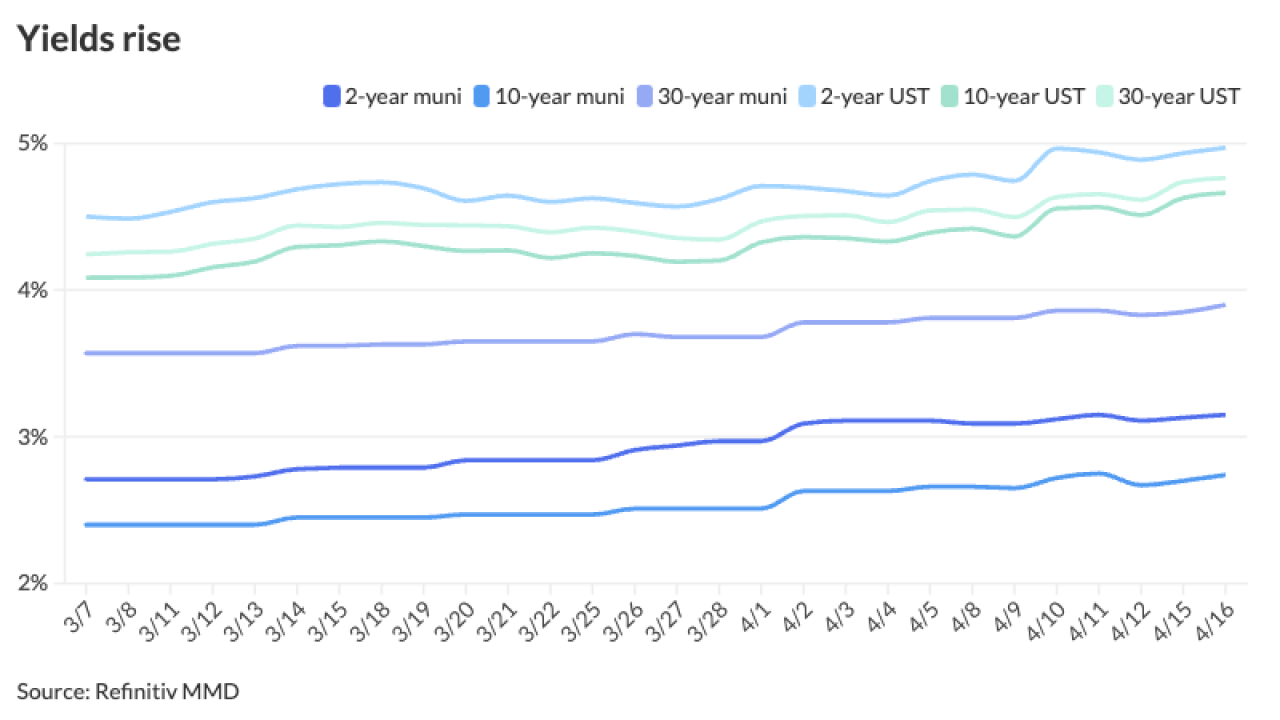Tax-exempt yields seem to keep breaking record lows. With a decent amount of new debt hitting the primary market Wednesday, buyers were scrambling to get their hands on bonds — at any cost.
For the second day in a row, buyers controlled the market and broke through record-low yields set the day before as recorded by Municipal Market Data.
Munis had a sizeable rally Wednesday, continuing the strengthening trend. Yields on the two-year fell three basis points to 0.38% while three-year to nine-year yields dropped two basis points. The 10-year yield fell three basis points to 1.79%, the 11-year dropped four basis points, the 12-year plummeted five basis points and the 13-year plunged six basis points. All yields longer than 14 years dropped seven basis points.
The 10-year’s 1.79% beats the previous record low of 1.82% as recorded by MMD Tuesday. The 30-year dropped seven basis points to 3.33%, beating the record 3.40% registered Tuesday.
Throughout the day, traders said the tax-exempt market was very busy as munis followed Treasuries higher. “The market is doing well and [is] very firm,” a trader in Chicago said.
The new-issue market is “improving current levels,” he said. There are also a lot of other factors that are contributing to the improving muni market, including overseas markets and strengthening Treasuries, the trader said.
Treasuries led the rally. The two-year yield fell one basis point to 0.24%. The benchmark 10-year yield and the 30-year yield each fell seven basis points to 1.91% and 2.97%, respectively.
“Customers and dealers are buying everything, again,” a New York trader said. “There are not many bonds left.”
“Who’s not buying — that is the question,” he added, referring to the different market participants who are jumping in to get a piece of the action.
In the primary market, Illinois competitively sold $800 million of general obligation bonds in two pricings. Wells Fargo won the bid for the $525 million tax-exempt deal and JPMorgan won the bid for $275 million of taxable bonds.
Yields on the $525 million tax-exempt deal ranged from 1.95% with a 4% coupon in 2017 to 4.386% with a 4.25% coupon in 2036. Debt maturing in 2013 was offered via sealed bid. Credits maturing from 2014 to 2016 and from 2027 to 2031, 2033, 2034 and 2037 were not formally reoffered. The bonds are callable at par in 2022.
Bonds maturing in 2032, 2035 and 2036 were insured by Assured Guaranty Municipal Corp. The insured credits were rated Aa3 by Moody’s Investors Service and AA-minus by Standard & Poor’s. Bonds maturing in 2032 yielded 4.148% with a 4% coupon and bonds maturing in 2036 yielded 4.386% with a 4.25% coupon. Bonds maturing in 2035 were not formally reoffered.
JPMorgan beat out eight other bidders for the $275 million taxable deal. Illinois officials said credits maturing in 2037 were 48 basis points lower than when Illinois issued a similar deal in July 2010.
The bonds had maturities ranging from 2013 to 2037 and coupons ranging from 0.75% to 5.75%. The bonds were not formally reoffered.
The Illinois deals come after Moody’s downgraded $27 billion of Illinois GOs to A2 from A1 and gave it a stable outlook, making it Moody’s lowest-rated state. For more on the Illinois pricing, see the story on the front page.
Citi won the bid for $380 million of Colorado Metro Wastewater Reclamation District revenue bonds. Yields ranged from 0.70% with a 5% coupon in 2016 to 3.17% with a 3% coupon in 2029. Credits maturing in 2024, 2025 and from 2030 to 2041 were not formally reoffered.
Bank of America Merrill Lynch priced $180 million of North Carolina grant anticipation revenue vehicle bonds. The credit is rated Aa2 by Moody’s, AA by S&P and AA-minus by Fitch Ratings.
Yields ranged from 0.55% with a 3% coupon in 2014 to 1.62% with a 5% coupon in 2019. Credits maturing in 2013 were offered via sealed bid. In the secondary market, trades reported by the Municipal Securities Rulemaking Board showed double-digit gains this week.
Bonds from an interdealer trade of New York Liberty Development Corp. 5s of 2044 yielded 4.37%, 20 basis points lower than where they traded last Friday. Bonds from an interdealer trade of Detroit Water Supply System 5.25s of 2041 yielded 4.90%, 16 basis points lower than where they traded last Friday.
While demand has skyrocketed in 2012, there were signs of buying appetite last December, which is fairly unusual for a month surrounded by holidays.
Generally speaking, demand for individual bonds falls as yields decline, according to Chris Shayne, senior market strategist at BondDesk Group. Yields fell consistently in December, so typically demand would fall as investors seek higher returns in other markets.
But in December, demand for individual bonds remained strong while demand for mutual funds and muni exchange-traded funds was very strong. “Demand has returned into the muni fund investment space,” Shayne said. “Investors were buying mutual funds and ETFs pretty aggressively.”
Those purchases drove yields down. “Retail investors of individual bonds were hurt by the demand in the fund space because it drove up prices,” Shayne said. “And it’s pretty significant.”
The average yield for all munis, including credits of all maturities and ratings, was about 4% at the beginning of December. At the end of the month, munis were hovering around 3.6%. “That’s quite low by historical averages,” he said.
Selling activity wasn’t as surprising. “With yields so low, you expect selling activity to be high so you can sell at a profit,” Shayne said. “But most muni retail participants don’t look at the problem that way. They usually look at the gains and want to keep the part of the portfolio that is doing well.”
In terms of trading volume, daily average volume in December was reasonably strong — and came in higher than in August and September.
“I think people are tired of extreme equity market volatility so they are continuing to buy muni bonds — despite low yields — because of the safe-haven aspect,” Shayne said. “This could be why demand in December was respectable even though you lost five solid trading days and yields hit historical lows.”





